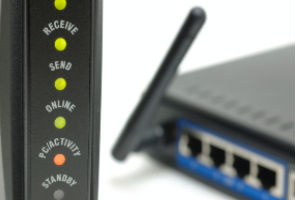- Home
- Internet
- Internet News
- Protect your WiFi or be a pedophile
Protect your WiFi or be a pedophile
By Associated Press | Updated: 15 June 2012 16:45 IST

Click Here to Add Gadgets360 As A Trusted Source

Advertisement
Lying on his family room floor with assault weapons trained on him, shouts of "pedophile!" and "pornographer!" stinging like his fresh cuts and bruises, the Buffalo homeowner didn't need long to figure out the reason for the early morning wake-up call from a swarm of federal agents.
That new wireless router. He'd gotten fed up trying to set a password. Someone must have used his Internet connection, he thought.
"We know who you are! You downloaded thousands of images at 11:30 last night," the man's lawyer, Barry Covert, recounted the agents saying.
They referred to a screen name, "Doldrum."
"No, I didn't," he insisted. "Somebody else could have but I didn't do anything like that."
"You're a creep ... just admit it," they said.
Law enforcement officials say the case is a cautionary tale. Their advice: Password-protect your wireless router.
Plenty of others would agree. The Sarasota, Fla. man, for example, who got a similar visit from the FBI last year after someone on a boat docked in a marina outside his building used a potato chip can as an antenna to boost his wireless signal and download an astounding 10 million images of child porn, or the North Syracuse, N.Y., man who in December 2009 opened his door to police who'd been following an electronic trail of illegal videos and images. The man's neighbor pleaded guilty April 12.
For two hours that March morning in Buffalo, agents tapped away at the homeowner's desktop computer, eventually taking it with them, along with his and his wife's iPads and iPhones.
Within three days, investigators determined the homeowner had been telling the truth: If someone was downloading child pornography through his wireless signal, it wasn't him. About a week later, agents arrested a 25-year-old neighbor and charged him with distribution of child pornography. The case is pending in federal court.
It's unknown how often unsecured routers have brought legal trouble for subscribers. Besides the criminal investigations, the Internet is full of anecdotal accounts of people who've had to fight accusations of illegally downloading music or movies.
Whether you're guilty or not, "you look like the suspect," said Orin Kerr, a professor at George Washington University Law School, who said that's just one of many reasons to secure home routers.
Experts say the more savvy hackers can go beyond just connecting to the Internet on the host's dime and monitor Internet activity and steal passwords or other sensitive information.
A study released in February provides a sense of how often computer users rely on the generosity -- or technological shortcomings -- of their neighbors to gain Internet access.
The poll conducted for the Wi-Fi Alliance, the industry group that promotes wireless technology standards, found that among 1,054 Americans age 18 and older, 32 percent acknowledged trying to access a Wi-Fi network that wasn't theirs. An estimated 201 million households worldwide use Wi-Fi networks, according to the alliance.
The same study, conducted by Wakefield Research, found that 40 percent said they would be more likely to trust someone with their house key than with their Wi-Fi network password.
For some, though, leaving their wireless router open to outside use is a philosophical decision, a way of returning the favor for the times they've hopped on to someone else's network to check e-mail or download directions while away from home .
"I think it's convenient and polite to have an open Wi-Fi network," said Rebecca Jeschke, whose home signal is accessible to anyone within range.
"Public Wi-Fi is for the common good and I'm happy to participate in that -- and lots of people are," said Jeschke, a spokeswoman for the Electronic Frontier Foundation, a San Francisco-based nonprofit that takes on cyberspace civil liberties issues.
Experts say wireless routers come with encryption software, but setting it up means a trip to the manual.
People who keep an open wireless router won't necessarily know when someone else is piggybacking on the signal, which usually reaches 300-400 feet, though a slower connection may be a clue.
For the Buffalo homeowner, who didn't want to be identified, the tip-off wasn't nearly as subtle.
That new wireless router. He'd gotten fed up trying to set a password. Someone must have used his Internet connection, he thought.
"We know who you are! You downloaded thousands of images at 11:30 last night," the man's lawyer, Barry Covert, recounted the agents saying.
They referred to a screen name, "Doldrum."
"No, I didn't," he insisted. "Somebody else could have but I didn't do anything like that."
"You're a creep ... just admit it," they said.
Law enforcement officials say the case is a cautionary tale. Their advice: Password-protect your wireless router.
Plenty of others would agree. The Sarasota, Fla. man, for example, who got a similar visit from the FBI last year after someone on a boat docked in a marina outside his building used a potato chip can as an antenna to boost his wireless signal and download an astounding 10 million images of child porn, or the North Syracuse, N.Y., man who in December 2009 opened his door to police who'd been following an electronic trail of illegal videos and images. The man's neighbor pleaded guilty April 12.
For two hours that March morning in Buffalo, agents tapped away at the homeowner's desktop computer, eventually taking it with them, along with his and his wife's iPads and iPhones.
Within three days, investigators determined the homeowner had been telling the truth: If someone was downloading child pornography through his wireless signal, it wasn't him. About a week later, agents arrested a 25-year-old neighbor and charged him with distribution of child pornography. The case is pending in federal court.
It's unknown how often unsecured routers have brought legal trouble for subscribers. Besides the criminal investigations, the Internet is full of anecdotal accounts of people who've had to fight accusations of illegally downloading music or movies.
Whether you're guilty or not, "you look like the suspect," said Orin Kerr, a professor at George Washington University Law School, who said that's just one of many reasons to secure home routers.
Experts say the more savvy hackers can go beyond just connecting to the Internet on the host's dime and monitor Internet activity and steal passwords or other sensitive information.
A study released in February provides a sense of how often computer users rely on the generosity -- or technological shortcomings -- of their neighbors to gain Internet access.
The poll conducted for the Wi-Fi Alliance, the industry group that promotes wireless technology standards, found that among 1,054 Americans age 18 and older, 32 percent acknowledged trying to access a Wi-Fi network that wasn't theirs. An estimated 201 million households worldwide use Wi-Fi networks, according to the alliance.
The same study, conducted by Wakefield Research, found that 40 percent said they would be more likely to trust someone with their house key than with their Wi-Fi network password.
For some, though, leaving their wireless router open to outside use is a philosophical decision, a way of returning the favor for the times they've hopped on to someone else's network to check e-mail or download directions while away from home .
"I think it's convenient and polite to have an open Wi-Fi network," said Rebecca Jeschke, whose home signal is accessible to anyone within range.
"Public Wi-Fi is for the common good and I'm happy to participate in that -- and lots of people are," said Jeschke, a spokeswoman for the Electronic Frontier Foundation, a San Francisco-based nonprofit that takes on cyberspace civil liberties issues.
Experts say wireless routers come with encryption software, but setting it up means a trip to the manual.
People who keep an open wireless router won't necessarily know when someone else is piggybacking on the signal, which usually reaches 300-400 feet, though a slower connection may be a clue.
For the Buffalo homeowner, who didn't want to be identified, the tip-off wasn't nearly as subtle.
Comments
For details of the latest launches and news from Samsung, Xiaomi, Realme, OnePlus, Oppo and other companies at the Mobile World Congress in Barcelona, visit our MWC 2026 hub.
Popular on Gadgets
- Samsung Galaxy Unpacked 2026
- iPhone 17 Pro Max
- ChatGPT
- iOS 26
- Laptop Under 50000
- Smartwatch Under 10000
- Apple Vision Pro
- Oneplus 12
- OnePlus Nord CE 3 Lite 5G
- iPhone 13
- Xiaomi 14 Pro
- Oppo Find N3
- Tecno Spark Go (2023)
- Realme V30
- Best Phones Under 25000
- Samsung Galaxy S24 Series
- Cryptocurrency
- iQoo 12
- Samsung Galaxy S24 Ultra
- Giottus
- Samsung Galaxy Z Flip 5
- Apple 'Scary Fast'
- Housefull 5
- GoPro Hero 12 Black Review
- Invincible Season 2
- JioGlass
- HD Ready TV
- Latest Mobile Phones
- Compare Phones
Latest Gadgets
- Apple iPhone 17e
- AI+ Pulse 2
- Motorola Razr Fold
- Honor Magic V6
- Leica Leitzphone
- Samsung Galaxy S26+
- Samsung Galaxy S26 Ultra
- Samsung Galaxy S26
- Asus TUF Gaming A14 (2026)
- Asus ProArt GoPro Edition
- Apple iPad Air 13-Inch (2026) Wi-Fi + Cellular
- Apple iPad Air 13-Inch (2026) Wi-Fi
- Huawei Watch GT Runner 2
- Amazfit Active 3 Premium
- Xiaomi QLED TV X Pro 75
- Haier H5E Series
- Asus ROG Ally
- Nintendo Switch Lite
- Haier 1.6 Ton 5 Star Inverter Split AC (HSU19G-MZAID5BN-INV)
- Haier 1.6 Ton 5 Star Inverter Split AC (HSU19G-MZAIM5BN-INV)
© Copyright Red Pixels Ventures Limited 2026. All rights reserved.












